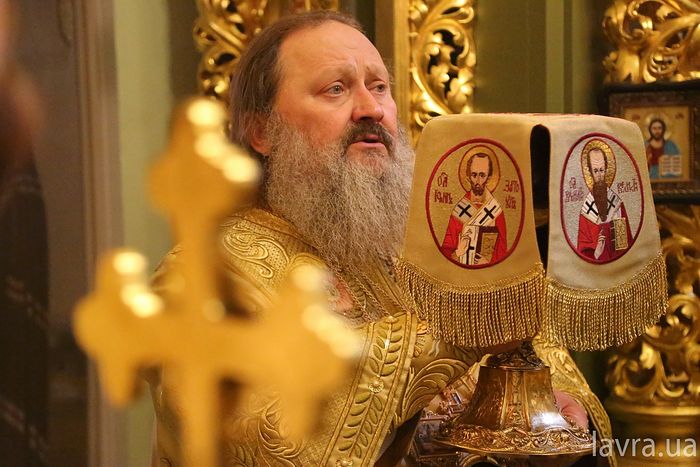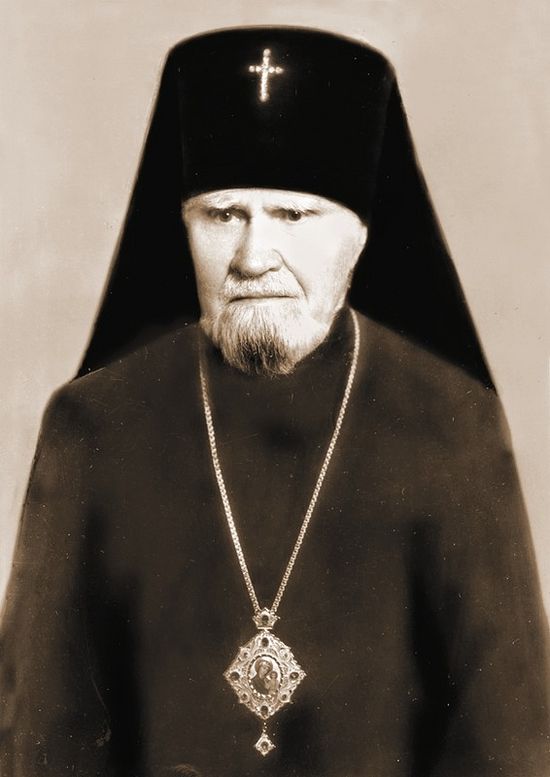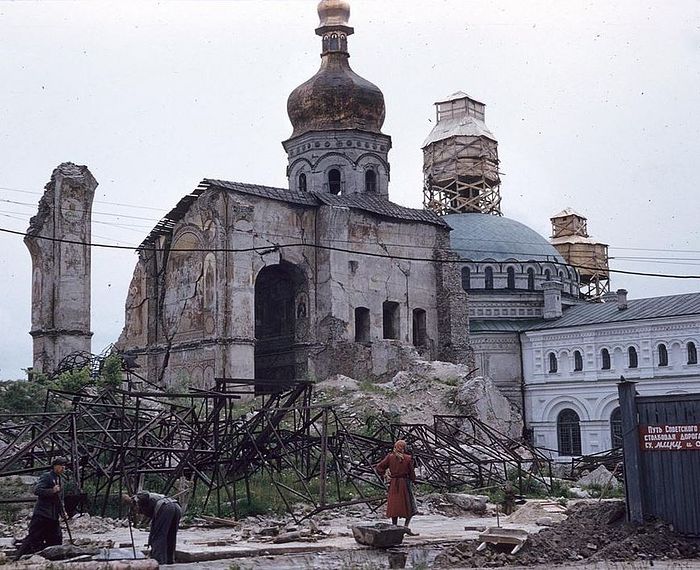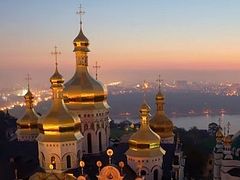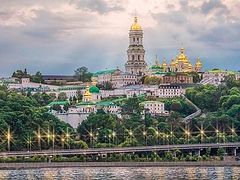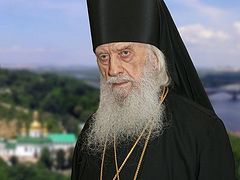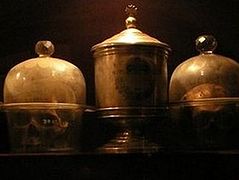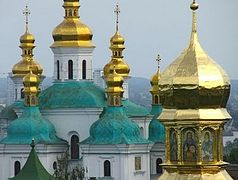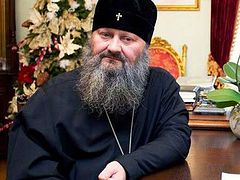Metropolitan Pavel (Lebed) of Vyshgorod and Chernobyl is known as a staunch defender of the Kiev Caves Lavra in modern history. He has served as its abbot for twenty-five years. Not only have the Lavra’s buildings risen from ruins in their former glory thanks to his labors and wisdom, spiritual life has been revived here as well. The Lavra’s brethren are constantly praying for the whole world; once a service in one of its churches has concluded, a new one begins in another church. Thousands of pilgrims, tourists and those coming here just out of curiosity touch and experience a different dimension of life in this place: My Kingdom is not of this world: if My Kingdom were of this world, then would my servants fight, that I should not be delivered to the Jews: but now is My Kingdom not from hence (Jn. 18:36).
Metropolitan Pavel has said: “If we are walking in the Truth of Christ, we are drawing close to holiness.” His Eminence has spoken about the holiness that has always existed and will ever exist in the Church, and about his meetings with holy elders and ascetics of piety in Russia and Ukraine.
—Your Eminence, can you tell us about the holy men that the Lord has sent you in your life?
—The Lord allows us to meet people of holy life to bring us to our senses. I am a sinful monk, but I have seen holy people and lived with holy monks, so I could talk about them for hours.
Archbishop Damian (Marchuk)
The first ascetic whom I met on my path of salvation was Archbishop Damian (Marchuk) of blessed memory. He was a humble, meek person of great wisdom. It was he who decided my fate by writing a letter of reference for me to enter the Moscow Theological Seminary back in 1984. At that time, reference letters would often read: “This candidate can read, sing, ‘walks on water’, and ‘plucks stars out of the sky.’” And here is what was written in mine: “I recommend this applicant to you.” When I saw this in my reference letter on the table of the ever-memorable Archbishop Alexander (Timofeyev), the seminary rector, I was startled beyond speech and thought: “Oh my God! There are 800 applicants, and only 100 of them will be admitted. And I have a recommendation letter like this!”1
Archbishop Alexander asked me if I knew Archbishop Damian. I said that I knew him. He inquired about Archbishop Damian’s health, we talked a little, and I was happily admitted. My spiritual life began from that very moment.
Archbishop Damian predicted the day of his repose. He asked Fr. George (who now serves in Germany): “Prepare a grave for the dead by Thursday.” “Who is the deceased?” “I will die,” he replied. And the prophecy was fulfilled: he passed away on the Thursday before Pentecost, and we buried him on Trinity Saturday. Thousands and thousands of people came to bid farewell to the newly-reposed. Indeed he was a man of deep faith who withstood all kinds of trials.
At the Holy Trinity-St. Sergius Lavra
My studies at the Holy Trinity-St. Sergius Lavra have remained in my memory forever—it was there that I learned the rudiments of faith. And I am still a very religious person and wholly devoted to the holy Russian Church. What did we know when we came to the seminary from rural areas? We knew that there was the Life-Giving Trinity, knew about the Church feasts and fasts, obeyed the commandments, and read the Gospel. And I believe that in the Soviet era, when the Church was persecuted, that was sufficient for one’s life as a Christian.
When I brought the necessary documents for admission, the Vice-Rector Mikhail Ivanov asked me why I came there, since I could expect neither recognition nor a salary at the seminary. “Why are you speaking to me in such manner?” I asked him indignantly. And Mikhail replied: “Peter [Metropolitan Pavel’s secular name], those of little faith will fall away, and genuine Christians will remain. The Church needs true pastors not hirelings.”
I was on very good terms with Archbishop Alexander, the seminary rector. After I had survived a fire in my bedroom that killed five of my roommates, he was a father figure to me. I have always prayed for him ever since. His repose on the feast of the Nativity was truly “blessed”. He bade farewell to everybody, celebrated the Liturgy, and breathed his last breath. Thus the Lord showed us a righteous man: Precious in the sight of the Lord is the death of His saints (Ps. 116:15).
During my studies Archimandrites Benedict, Platon, Kirill, Naum, Athanasius, Anastasius, and Matthew from the Holy Trinity-St. Sergius Lavra were embodiments of the monastic ideal for me. As I listened to them I absorbed all their words like a sponge.
I loved Archimandrite Kirill (Pavlov) dearly. From time to time we gathered in his cell in the evening, and Fr. Kirill would read the New Testament and bless me to read the Philokalia and the Old Testament. It was touching when after the reading he gave a piece of white bread, and two pieces of fish or two “Clumsy Bear” wafers covered in chocolate [popular Soviet sweets] to each of us students. Schema-Hieromonk Moses attended these readings as well. He was a learned man, a mathematician, and the author of secondary school textbooks. Whenever Fr. Moses accidentally fell asleep, and Fr. Athanasius nudged him in the side, Fr. Kirill would say: “Don’t touch him. He is conversing with angels.” This is how Fr. Kirill shared his abundant love, which touched our hearts! In due time the Church will officially recognize the spiritual labors of this elder.
Guess what else amazed me? Whenever we celebrated the Paschal Liturgy, Fr. Kirill would toss Paschal eggs (for parishioners to catch)—ordinary painted, decorated, and stone ones—about 300 in number, if not more. He wanted everybody to receive his blessing. This left its imprint on my heart, and afterwards I tried to do the same as a parish priest.
 Archimandrite Matthew (Mormyl; 1938-2009), senior choir director of the Holy Trinity—St. Sergius Lavra
Archimandrite Matthew (Mormyl; 1938-2009), senior choir director of the Holy Trinity—St. Sergius Lavra One day Fr. Matthew (Mormyl) lost a book and said to me: “You won’t have a life if you don’t find the book!” And I was in charge of putting the services together. “What should I do?” I thought. I turned to Fr. Onuphry (Berezovsky), then deputy abbot of the Lavra and our current beloved primate of the Ukrainian Orthodox Church of the Moscow Patriarchate, and said: “Fr. Matthew has said that I won’t have a life.” (He was very kind and very strict at the same time). “All will be exactly as he said. Go to Anastasius.” I came up to Fr. Anastasius, and he said: “My prayer rises no higher than the Lavra’s bell-tower; so go back to Fr. Onuphry—he has a book of this kind and will share it with you.” When I came to choir practice, I saw Fr. Matthew sitting there: “I found my book! I found my book!” I was absolutely seething: “But what shall I do with this one?” “Now I have mine, and you have yours,” he said with a smile.
For me all of these wonderful elders will remain great teachers forever, and the Holy Trinity-St. Sergius Lavra will remain a school of piety.
At the parish
Upon completion of my seminary education in 1988, I was sent to the Diocese of Volhynia and Rovno, where I met a genuine holy elder—Archbishop Varlaam (Ilyushchenko). He had been imprisoned for nine years and served his term in Baryshevka in the Kiev region. In prison he was mocked for being a priest, so he had to go on a hunger strike. Later, by the intercession of Metropolitan Nikodim (Rotov), Archbishop Varlaam was released after serving half of his prison term.
He both ordained me a priest and tonsured me. The archbishop was a real ascetic of piety and a confessor of the Church of Christ. He was not afraid to openly preach the faith, ordained clergymen without watching for the authorities’ reaction, and did all that was necessary for the life of the Church. He wanted me to remain there as the secretary of his diocese of Dnepropetrovsk, but died suddenly. I grieved over his death and had a monument to him erected above his grave. However, the workers did it carelessly, and when the ruling hierarch blessed us to straighten it and the grave was dug up, his relics were found incorrupt.
Archbishop Varlaam predicted all the events in my life that have occurred over these twenty-eight years since his death. He also said to me: “You will spend all your life on a construction site but will die among ruins...”
Anna the barefoot
I have seen many righteous men and women. They have always been and will always be in the Church. There lived a woman named Anna in Novovolynsk, nicknamed “Anna the Barefoot”, who knew the New Testament, the Psalter, and canons by heart. She was a fool-for-Christ. One day, when she was feeding her sick mother, the latter choked on some kefir and died in her (Anna’s) arms. After that tragedy Anna made up her mind to atone for her involuntary sin by walking barefoot in the winter.
She would enter the church which had grown very chilly and take her overcoat off, remaining barefoot, wearing only a simple dress with sleeves just below her shoulders. She would stand with a cloud of vapor above her. When on the feast of the Baptism of the Lord in 1989 we went outside, unable to stop our teeth from chattering due to the piercing cold, she heaped up snow and stood on it coatless, with only a light headscarf on her head. And I was seized by terror: water was running from under her feet, and she was steaming.
When I came to give her Communion the day before her repose, Anna told me that she knew the New Testament by heart. And added: “You will be killed by your own people!”
When Anna was dying, she asked us to take her body into the church after her repose and leave her alone there for a while, which we did. And I have felt the power of her intercessions and have been praying for her ever since (I pray for all whom I buried there in Novovolynsk at every Liturgy).
Holy primates of the Ukrainian Church
I unexpectedly ended up in Kiev; frankly, I believed then that I would serve as a parish priest-monk for the rest of my life. The door to the spiritual world opened before me. The first outstanding representative of that realm was our previous primate, the ever-memorable Metropolitan Vladimir (Sabodan). I could talk about him for hours, for days. I was near him for twenty-one years, of them eighteen years permanently. We would talk a lot, and His Beatitude would reveal the depths of his soul to me. For me he was an extraordinary man, radiant with the grace of the Holy Spirit. It was he who preserved the unity of the canonical Church in Ukraine for over twenty years.
I accompanied His Beatitude to the Holy Land on many occasions. Praying by the Holy Sepulcher there, Metropolitan Vladimir would implore the Savior: “Lord, I want neither good health nor a long life. I only ask you not to allow a single drop of blood to be spilled on my land that was blessed by God.” Indeed as long as the Metropolitan was alive, nothing bad happened to his country2.
Another wonderful hierarch of holy life is His Beatitude Metropolitan Onuphry. Many criticize him for not being a public personality (which, in their view, befits his rank) and the lack of pomp and eloquence in his sermons. But his words always touch the hearts of the faithful.
The Holy Spirit has guided and preserved this man for our edification. He is a man of constructive labor, meek, patient, a faster, and a man of prayer. He is an example to all of us.
The brethren of the Kiev Caves Lavra
In our holy monastery, “the summit of the spiritual heights” is the humble Archimandrite Avraamy (Kuyava), a recluse. Although he is over ninety, he knows everything about each of our brothers. Through his prayers, and through the prayers of Fathers Nektary, Anthony, Jeremiah and other monks—Of whom the world was not worthy (Heb. 11:38)—peace is achieved and our holy monastery will be preserved by the Lord.
Our brethren live in the center of our capital, a megalopolis; yet nobody will ever see them lounging about or idle—they are always busy doing their work, and everything is accomplished through their labors. They have cordially received hundreds of thousands of guests at our holy monastery (and perhaps millions of them over the twenty-five years of my abbacy). The brethren are real toilers in the vineyard of Christ. And I will repeat the words of His Beatitude Metropolitan Vladimir, who once said to me and another hierarch: “I am ready to ‘share a foxhole’ with you!” And indeed you can follow these brethren into combat, just as Monks Alexander Peresvet and Andrei Oslyabya once went to fight at Kulikovo Field.
Our brethren are keepers of the purity of holy Orthodoxy, the faith of Christ, and the salvation of human souls. In due time the Lord will ask us: “You came to the Church, but who did you bring with you?” I believe that each of them will be able to answer: “Here I am, O Lord, with the children that Thou gavest me.”
The prayer of those who are not saints on earth can make us into saints in Heaven
—Your Eminence, you’ve just mentioned both living and departed individuals as models of holiness. Does this mean that there is no limit to sanctity?
—All human beings are alive to the Creator, and nobody is “dead” to Him. There was separation before the Resurrection of Christ; that is why the Lord said: Between us and you there is a great gulf fixed (Lk. 16:26). After His Resurrection, Divine Grace has worked in the world.
There is a popular legend often retold at the Kiev Caves Lavra. There lived one monk who was negligent and remiss. When he died, his body started to stink. The father-superior began praying to God: “Lord, hearken to the prayers of our Father Theodosius: ‘Thou will be a reed shaken with the wind (cf. Mt. 11:7) and will be saved.’” And next morning the monk’s relics were found incorrupt!
Nobody and nothing can separate us from the love of Christ (cf. Rom. 8:35). Even if our own negligence destroys us, then the prayer of those who are not yet saints on earth can make us into saints in Heaven.
—When you were speaking about the people you knew personally, a smile lit up your face. The warmth of their hearts has been communicated to us through you. These were different people: Some took up the ascetic labor known as “foolishness-for-Christ” on and walked barefoot; others comforted people with their love and treated poor students to sweets… What is the path to holiness like?
—There are as many paths to Christ and the Heavenly Kingdom as there are souls on the Earth. For a Christian the most important law is the Law of Christ. We cannot be citizens of earth and citizens of Heaven at the same time—the only source of light is Christ. He equally blesses, enlightens, and illumines the path in everybody’s life. Whether we draw near to Him or drift away from Him depends on us.
Christ said that He is the light and the truth. If we are walking in the truth of Christ, we are drawing closer to holiness.

